Fiji, 28 August 2025
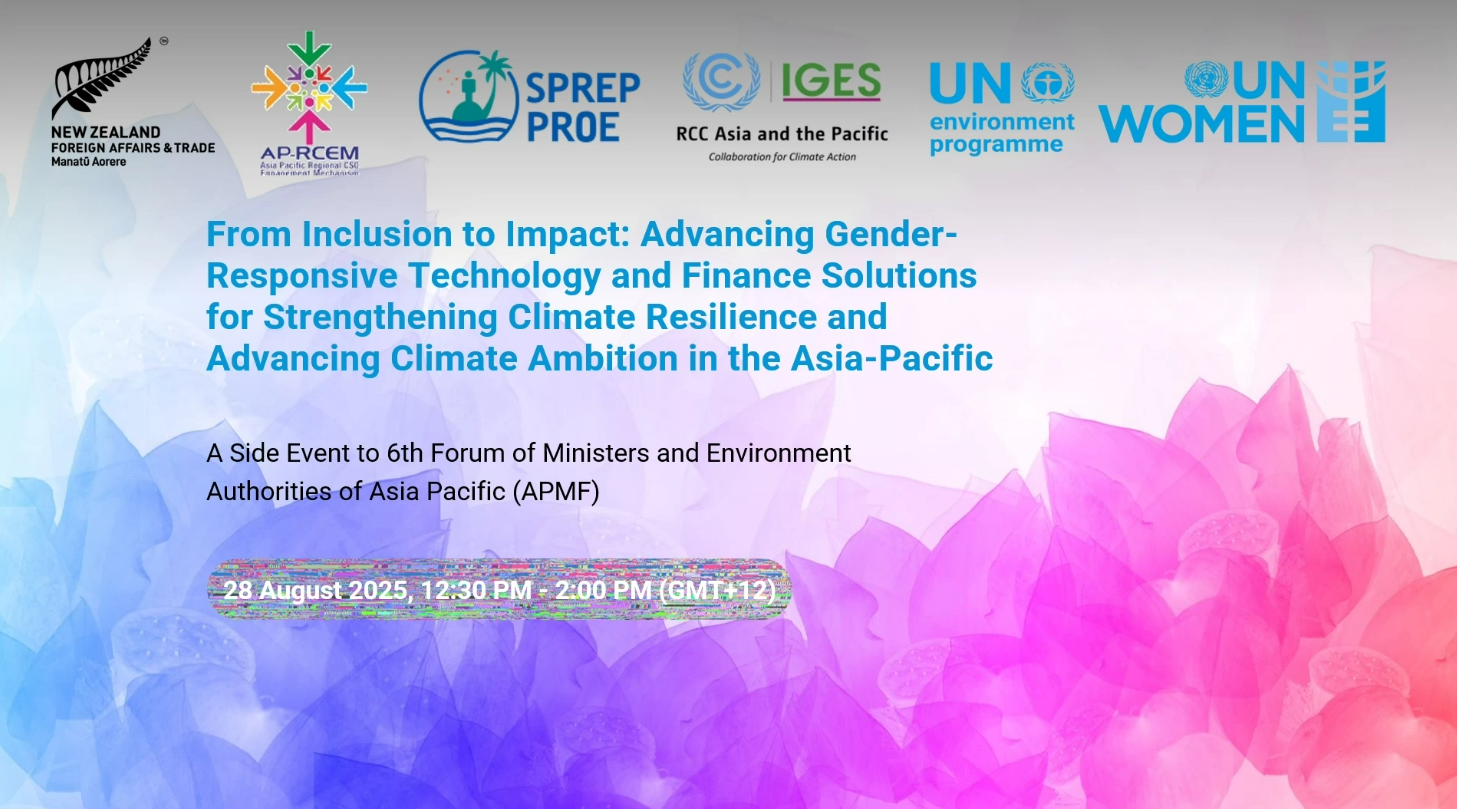
Photo 1. Poster of the event: “From Inclusion to Impact: Advancing Gender-Responsive Technology and Finance Solutions for Strengthening Climate Resilience and Advancing Climate Ambition in the Asia-Pacific.
The ASEAN Climate Change and Energy Project (ACCEPT) Phase II participated in the UNEP and UN Women panel discussion “From Inclusion to Impact: Advancing Gender-Responsive Technology and Finance Solutions for Strengthening Climate Resilience and Advancing Climate Ambition in the Asia-Pacific.” This event was held in conjunction with the 6th Forum of Ministers and Environment Authorities of Asia Pacific (APMF) and provided an important platform to highlight the role of inclusive and gender-responsive approaches in addressing climate challenges across the region.
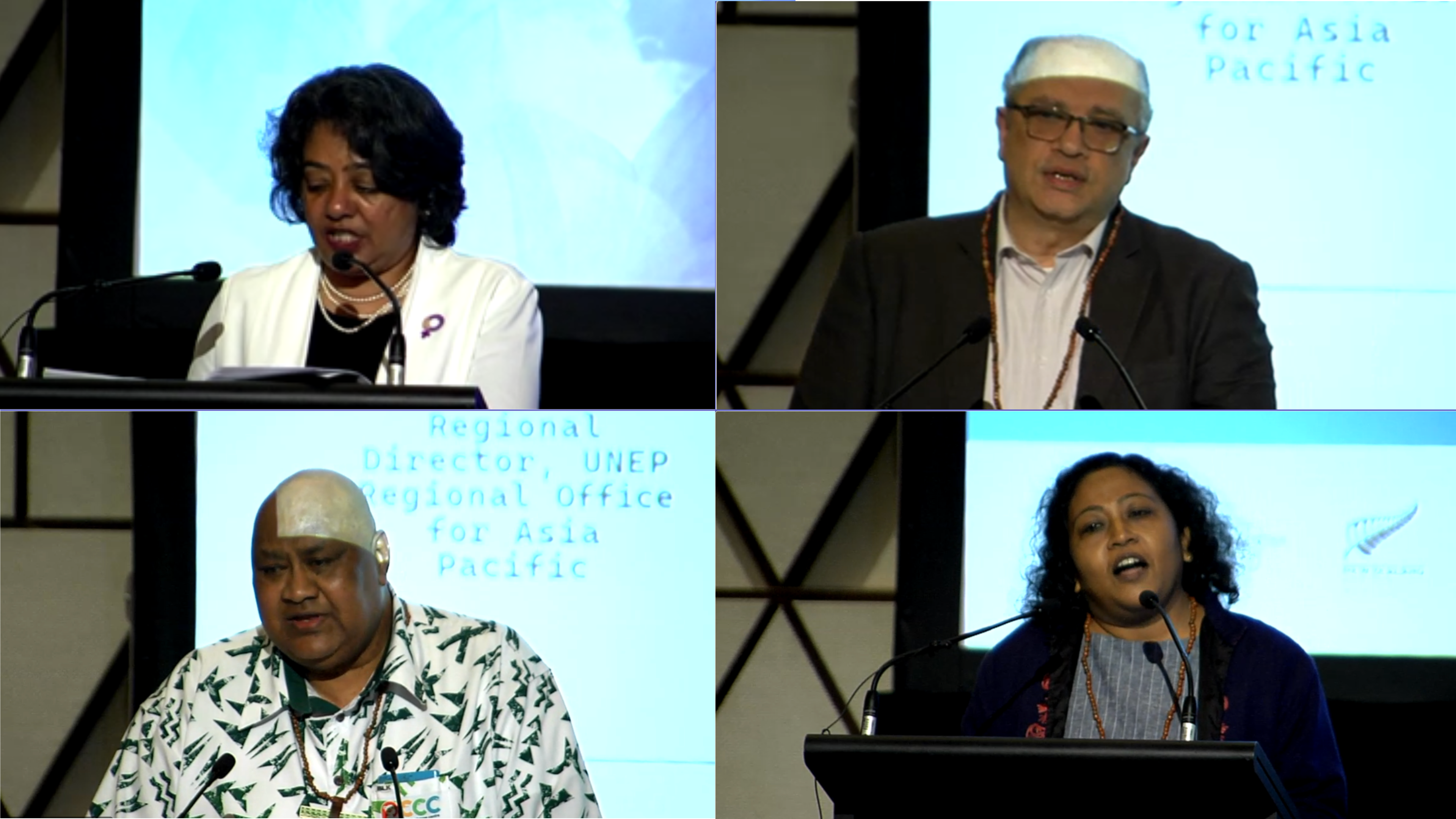
Photo 2. (Left to right) Opening remarks featuring Ms. Sashi Kiran, Minister for Women, Children, and Social Protection of Fiji; Dr. Youssef Nassef, Director of The Adaptation Division of the United Nations Framework Convention on Climate Change (UNFCCC); and Mr. Sefanaia Nawadra, Director General of the Secretariat of the Pacific Regional Programme (SPREP). Followed by an an update on Compendium of Climate Change Studies by Dr. Paramita Mohanty, Programme Management Officer and Regional Lead for Passive Cooling and Cold Chain, UNEP.
The event was opened by Ms. Sashi Kiran, Minister for Women, Children, and Social Protection of Fiji, where she highlighted the importance of upholding climate actions it is highly impacting the livelihood of people in the Pacific Islands, especially women and marginalised people, making their inclusion in all levels of policymaking crucial. The opening was followed by remarks from Ms. Jillian Dempster, Chief Adviser of International Environmental Negotiations, Climate, Antarctica, and Environment Division, New Zealand Ministry of Foreign Affairs and Trade, Dr. Youssef Nassef, Director of The Adaptation Division of the United Nations Framework Convention on Climate Change (UNFCCC), and Mr. Sefanaia Nawadra, Director General of the Secretariat of the Pacific Regional Programme (SPREP). While they bring diverse perspectives, it is clear that the message is to shift the narrative not to only focus on technical solutions, but to values of care, equity, and stewardship.
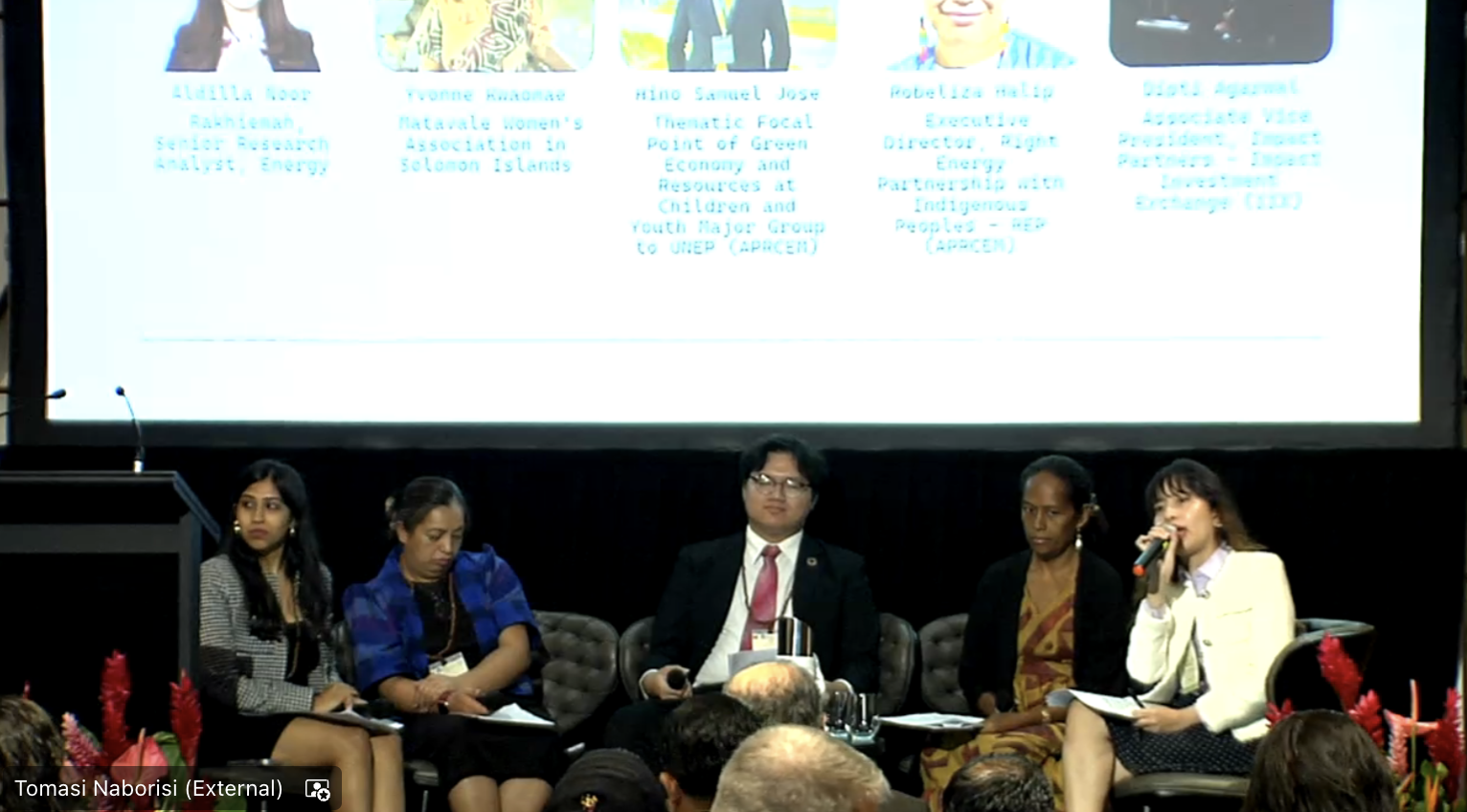
Photo 3. (Left to right) Panel 1 featuring Ms. Dipti Agarwal, Associate Vice President of Impact Partners – Impact Investment Exchange (IIX); Ms. Robeliza Halip, Executive Director of Right Energy Partnership with Indigenous Peoples – REP (APRCEM); Mr. Hino Samuel Jose, Thematic Focal Point of Green Economy and Resources at Children and Youth Major Group to UNEP (APRCEM); Ms. Yvonne Kwaomae, Representative from the Metavale Women’s Association in Solomon Island; and Ms. Aldilla Noor Rakhiemah, Project Manager of ACCEPT.
Various representatives from non-state organisations shared their insights during the first panel titled: “Non-State Actors’ Perspectives on Innovative Strategies and Solutions for Sustainable Climate Resilience for Asia-Pacific.” Ms. Aldilla Noor Rakhiemah, Project Manager of ACCEPT, explained the core regional initiatives that have been most effective in helping ASEAN countries in scaling up renewable energy adoption and raise climate ambition through their Nationally Determined Contributions (NDCs). The first initiative is the ASEAN Plan of Action on Energy Cooperation (APAEC), ASEAN’s regional energy blueprint. The upcoming APAEC cycle (2026–2030) has adopted the theme of a just and inclusive energy transition, reflecting ASEAN’s recognition of the importance of inclusivity in shaping the region’s energy future. The second initiative is the ASEAN Energy Outlook (AEO), the flagship publication of the ASEAN Centre for Energy. The AEO provides projections of the region’s energy landscape under multiple scenarios, offering insights that inform policy planning and investment strategies. The third initiative is the ASEAN Power Grid (APG), which seeks to build a unified and integrated regional electricity market. By strengthening cross-border interconnections, the APG enhances energy security, affordability, and sustainability while unlocking greater opportunities for renewable energy deployment across ASEAN.
Further perspectives were shared by Ms. Yvonne Kwaomae from the Metavale Women’s Association in Solomon Island, who explained that her organisation has been conducting climate adaptation measures, especially on rural-based finance management, food security through new agricultural techniques, and disaster preparedness. Mr. Hino Samuel Jose, Thematic Focal Point of Green Economy and Resources at Children and Youth Major Group to UNEP (APRCEM), shared his insights on children and youth inclusion in climate action, noting their important role in mobilising innovation.
Meanwhile, Ms. Robeliza Halip, Executive Director of Right Energy Partnership with Indigenous Peoples – REP (APRCEM), shared her experiences in guiding renewable energy projects for indigenous people and establishing indigenous to indigenous people exchange. She highlighted that they should be recognised not only as beneficiaries of development projects, but as agents able to lead their own renewable energy initiatives and development aspiration. To close the panel, Dipti Agarwal, Associate Vice President of Impact Partners – Impact Investment Exchange (IIX), highlighted that women face unique barriers to accessing capital and opportunities, and are disproportionately affected by climate change—placing them closest to the issues and best positioned as problem solvers. She emphasised the need for enabling ecosystem of policy, capital, data, markets, and balanced leadership to unlock full financing potential.
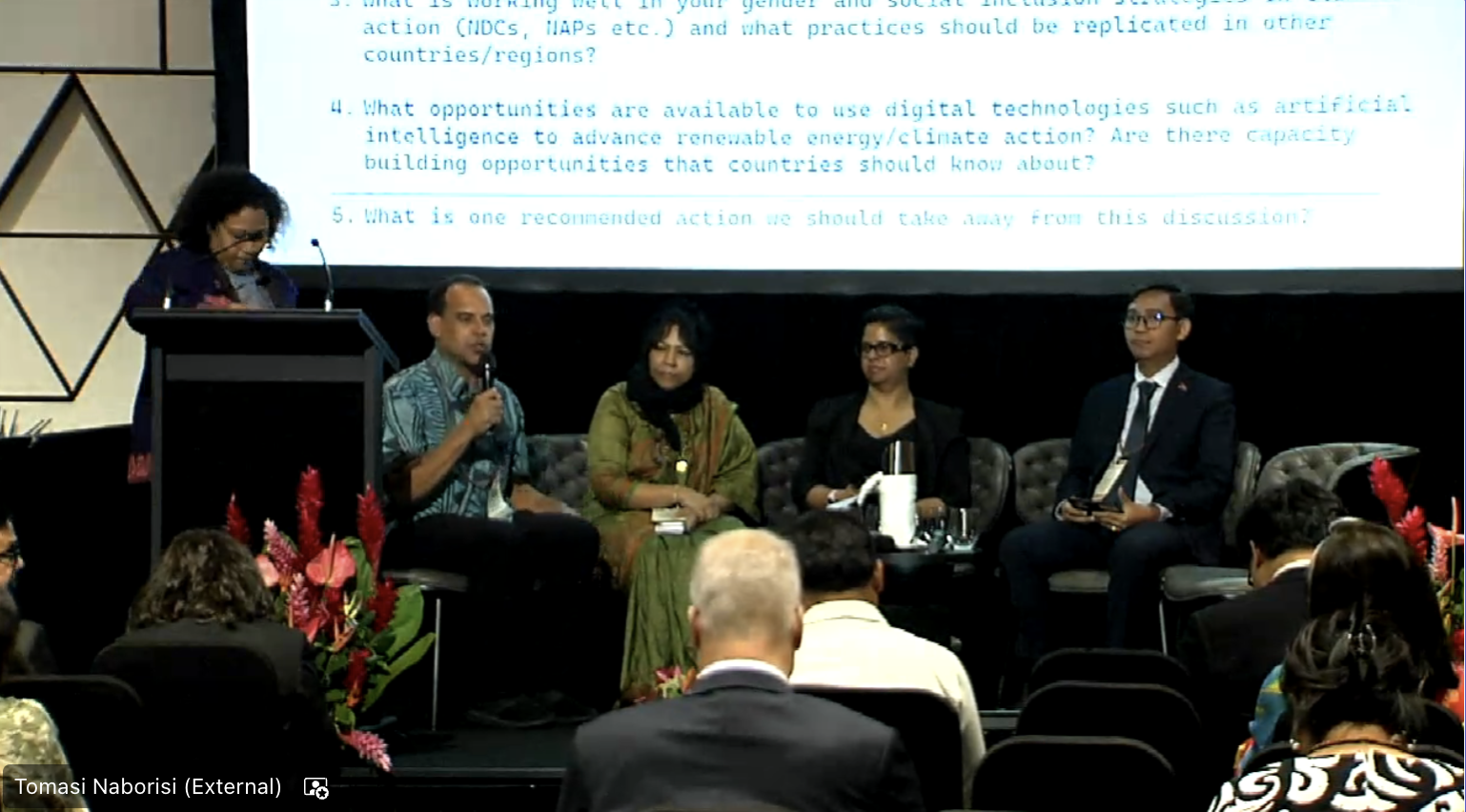
Photo 4. (Left to right) Panel 2 as moderated by Dr. Paramita Mohanty, Programme Management Officer and Regional Lead for Passive Cooling and Cold Chain, UNEP, featuring H.E. Mr. Ralph Regenvanu, Minister of Climate Change Adaptation, Meteorology, and Geo-Hazards, Energy, Environment, and National Disaster Management of the Republic of Vanuatu; Dr. Farhina Ahmed, Secretary of Ministry of Environment, Forest, and Climate Change of the Republic of Bangladesh; Ms. Bindula Devi, Director of the Ministry of Local Government of the Republic of Fiji; and Mr. Sok Seyla, Deputy Director of the Department of Science and Technology, General Directorate of Policy and Strategy of the Ministry of Environment of the Kingdom of Cambodia.
The second panel, titled “Transforming Climate Policy Monitoring: Member States’ Perspectives on Gender, Inclusion, Finance, and Technology,” brought several representatives from Asia-Pacific countries. H.E. Mr. Ralph Regenvanu, Minister of Climate Change Adaptation, Meteorology, and Geo-Hazards, Energy, Environment, and National Disaster Management of the Republic of Vanuatu, shared that Vanuatu established the CB2-CCCED which are cross-cutting development policies and programmes. He also shared that the government has been installing satellite internet services around the archipelago to link communities and speed up disaster response time. Meanwhile, Dr. Farhina Ahmed, Secretary of Ministry of Environment, Forest, and Climate Change of the Republic of Bangladesh highlighted the importance of translating initiatives from the United Nations level to the national and local level.
Ms. Bindula Devi, Director of the Ministry of Local Government of the Republic of Fiji, stated that climate action and the gender lens to protect the rights and interests of women at the local level. Lastly, Mr. Sok Seyla, Deputy Director of the Department of Science and Technology, General Directorate of Policy and Strategy of the Ministry of Environment of the Kingdom of Cambodia, shared that the country has just submitted their third NDC. In the drafting process, the government held consultations with diverse stakeholders, including a very specific event for women and marginalised people.
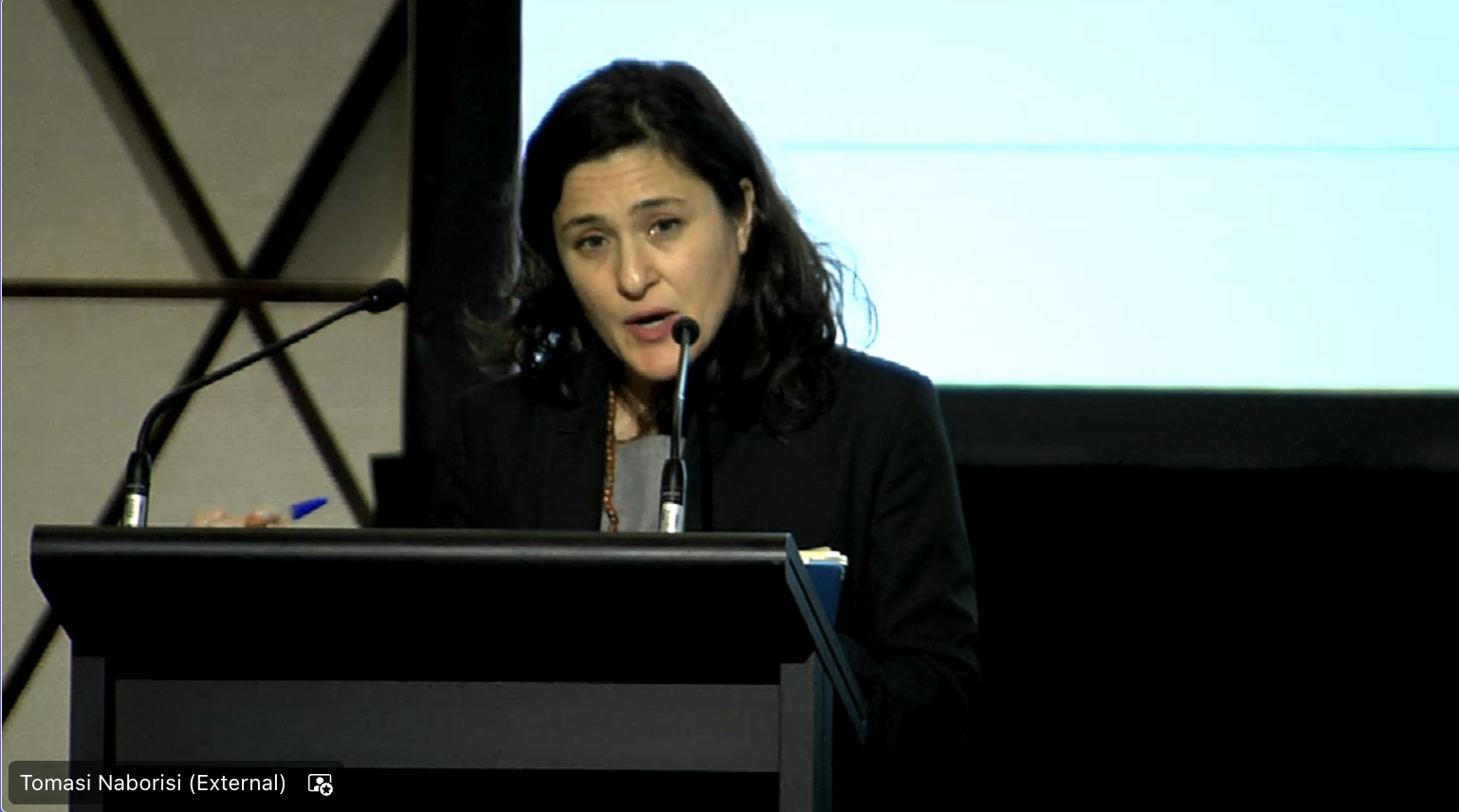
Photo 5. Closing Remarks by Ms. Alison Davidian, UN Women Fiji Multi-Country Office Representative.
To conclude the session, Ms. Alison Davidian, UN Women Fiji Multi-Country Office Representative, highlighted three key takeaways. First, climate action must be integrated rather than siloed, bringing together finance, technology, and inclusivity, supported by digital transformation for disaster response and grounded approach in cultural context. Second, gender and social inclusion must be seen as the key driver rather than an add-on. Without diverse decision-makers, financial mechanisms cannot truly be inclusive. The narrative should shift to viewing women and marginalised groups as leaders. Third, advancing innovative finance is essential to unlock technology and community resilience. This means prioritising women’s access to resources to credit, to subsidies for climate smart technologies, and capacity building opportunities, while also channelling grants to women and local organisations that are first responders to climate crisis.
(NA, HEPR)
**
Join our ASEAN Researchers Network on Climate Change (ARNECC) by registering yourself here. Become a part of our collaborative efforts to address pressing climate challenges and shape a sustainable future.
Detailed information on ACCEPT II can be found at https://accept.aseanenergy.org/
Follow our social media to stay updated on ASEAN’s energy-climate nexus and ACCEPT activities.